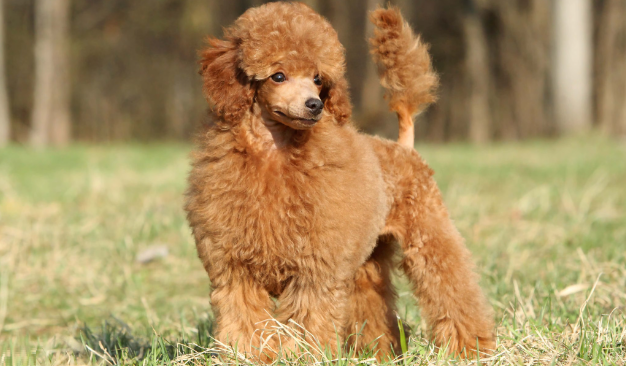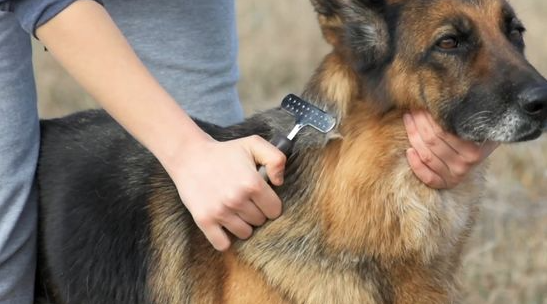Poodles
Poodles are one of the most well-known and beloved dog breeds in the world, and poodle temperament is a very friendly, playful, responsive, and fun-making dog breed. Known for their curly coats and distinctive grooming styles, they are a breed that combines beauty, brains, and a wonderful temperament. Originally bred as water dogs, their intelligence and agility make them ideal for various roles, from hunting companions to therapy animals.
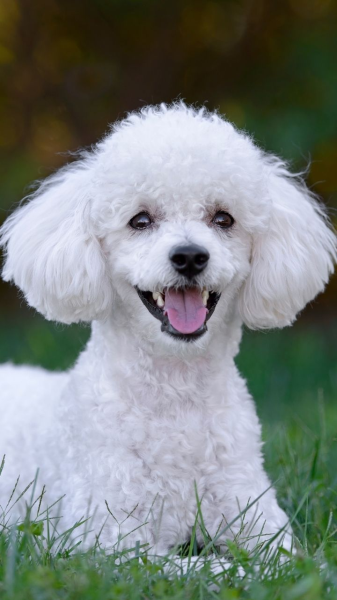
They are more than just a pretty face; they are incredibly smart, loyal, and energetic dogs, making them a favorite choice for families, singles, and seniors alike. This guide will walk you through everything you need to know about poodles, from their history to their care, and more.
History of Poodles
Origin and Evolution
They have a long and rich history, dating back several centuries. Contrary to popular belief, They did not originate in France but are thought to have first appeared in Germany, where they were bred as water retrievers. The name “Poodle” comes from the German word “Pudel,” meaning “to splash in water.” Over time, the breed became associated with France, where they gained popularity among the French aristocracy.
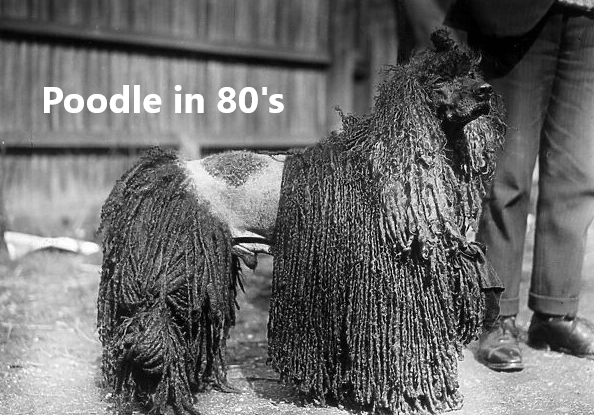
Role in Society Through History
Poodles were not just hunting companions; they were often seen in circuses due to their high intelligence and ability to learn tricks. Their elegant appearance and showmanship earned them a place in the homes of European royalty. Over the years, their role expanded to include work as service animals, therapy dogs, and competitive show dogs.
Varieties And Size
Standard, Miniature, and Toy Poodles
They come in three distinct sizes: standard, miniature, and toy. Despite their size differences, all these dogs belong to the same breed and share similar traits.
- Standard Poodles: The largest of the three, they stand over 15 inches tall and are often used as service animals due to their strength and stamina.
- Miniature Poodles: Standing between 10 and 15 inches tall, these medium-sized are great for families and apartment living.
- Toy Poodles: The smallest variety, Toy Poodles, stand under 10 inches tall and make great companions for people with limited space.
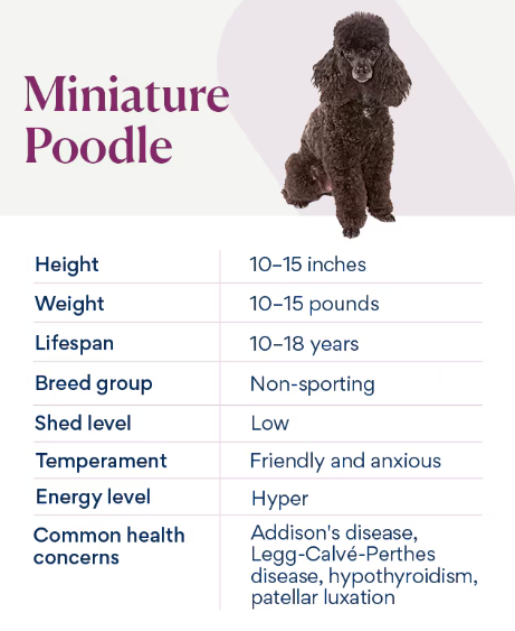
Vital Stats
| Size: | Medium |
|---|---|
| Coat: | Thick, curly, hypoallergenic |
| Exercise: | 1 hour a day |
| Life span: | 12–15 years |
| Breed group: | Utility |
| Temperament: | Intelligent, friendly, responsive, alert |
Key Differences Between Sizes
While size is the primary differentiating factor, each variety has slight differences in energy levels, care needs, and temperament. Standard Poodles tend to be more active and require more exercise, while Toy Poodles are content with less activity but still need mental stimulation.
Physical Characteristics

Coat Types and Colors
They are famous for their thick, curly coats, which are hypoallergenic, making them a good option for people with allergies. The coat comes in various colors, including black, white, apricot, silver, and parti-color (two-tone).
General Body Structure
They have a balanced and athletic build, with a square-shaped body. Their long necks, straight backs, and graceful movements make them stand out in any setting.
Temperament and Personality
Poodles personality are known for their knowledge and teachability. They’re energetic, dynamic canines that blossom with both physical and mental excitement. Poodles temperament are additionally loving and bond intimately with their families. Their amicable and friendly nature makes them incredible associates and family pets.
Intelligence and Trainability
They are widely recognized as one of the smartest dog breeds. Their intelligence makes them highly trainable, excelling in obedience and agility training. They love to learn new tricks and are eager to please their owners.
Social Nature
They are also known for their friendly and affectionate nature. They form strong bonds with their families and enjoy being the center of attention. However, they can be sensitive to harsh treatment, so positive reinforcement works best when training them.
Grooming Requirements
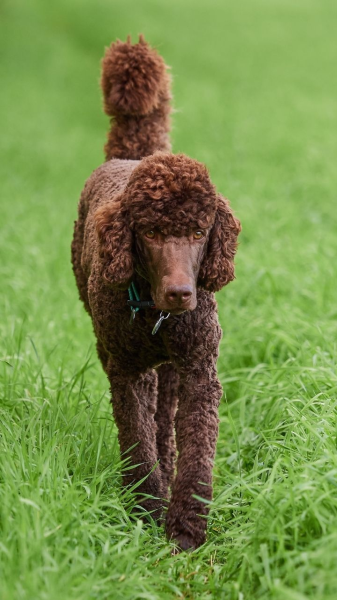
Brushing and Coat Care
The curly coat of a Poodle requires regular brushing to prevent matting. It’s essential to use a brush designed for their unique coat texture, and many owners opt for professional grooming every 4 to 6 weeks.
Frequency of Professional Grooming
Poodles are high-maintenance when it comes to grooming. In addition to regular brushing, they require frequent trimming to keep their coats looking their best. Many Poodle owners choose popular grooming styles like the “Continental” or “Puppy” clip.
Exercise Needs of Poodles
Ideal Physical Activities
They are active dogs that require daily exercise to stay happy and healthy. Activities like long walks, swimming, and playing fetch are ideal for keeping them physically fit.

Mental Stimulation
In addition to physical exercise, Poodles thrive on mental stimulation. Puzzle toys, interactive games, and training sessions help keep their sharp minds engaged.
Training: Tips and Techniques
Basic Commands
Due to their intelligence, Poodles quickly pick up basic commands such as sit, stay, and come. Consistency is key to ensuring these commands are ingrained.
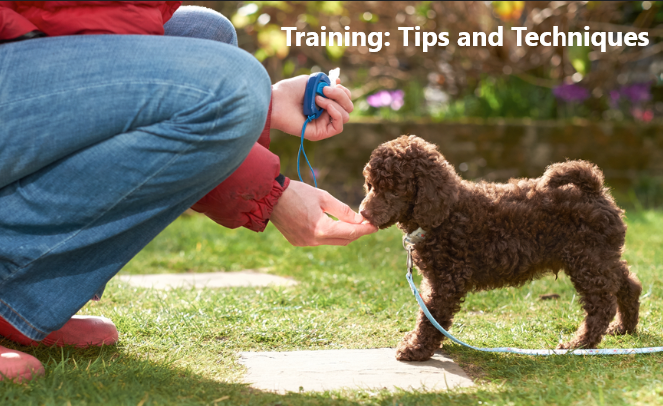
Advanced Training and Tricks
They are excel in advanced obedience and trick training. Many owners find that teaching their Poodles tricks, such as rolling over or fetching specific items, provides excellent mental stimulation.
Poodle Health and Lifespan
Common Health Issues
Like all breeds, Poodles can be prone to specific health problems. Common issues include hip dysplasia, eye disorders, and skin conditions. Regular vet check-ups can help catch and address these issues early.
How to Ensure a Long, Healthy Life
Feeding your Dogs a balanced diet, ensuring regular exercise, and keeping up with vet visits are the best ways to ensure your Poodle lives a long and healthy life. Standard Poodles tend to live around 12–15 years, while smaller varieties may live slightly longer.
Feeding and Nutrition
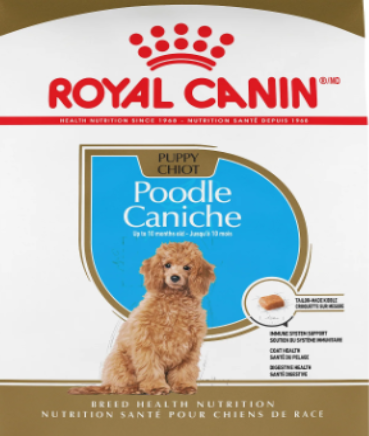
Best Diet
Poodles thrive on high-quality, nutrient-dense food. Whether it’s commercial kibble, raw food, or home-cooked meals, it’s crucial to ensure their diet is balanced and appropriate for their size and activity level.
Foods to Avoid
Certain foods, such as chocolate, grapes, and onions, are toxic to Poodles and should always be avoided. Additionally, excessive fat and sugar can lead to obesity and other health problems.
Poodles and Families: Compatibility
How Poodles Interact with Children
They are generally excellent with children, especially when properly socialized from a young age. They are playful, patient, and gentle, making them ideal companions for families.
Poodles with Other Pets
They can coexist peacefully with other pets, including cats and other dogs, particularly if they are introduced to them in a controlled environment.
Traveling with Poodles
Preparing Your Dog for Travel
When traveling with dogs, it’s essential to acclimate them to car rides or plane trips early on. Make sure they are comfortable in a travel crate or seat harness.
Essential Items for Traveling
Be sure to pack essentials like water, food, toys, and grooming tools when traveling with your dog. These will help keep them comfortable and entertained during the journey.
Famous Poodles in Pop Culture
Movies and TV Shows
They have been featured in numerous movies and TV shows, often playing the role of the elegant and pampered pet. Their distinctive appearance makes them a popular choice for filmmakers.
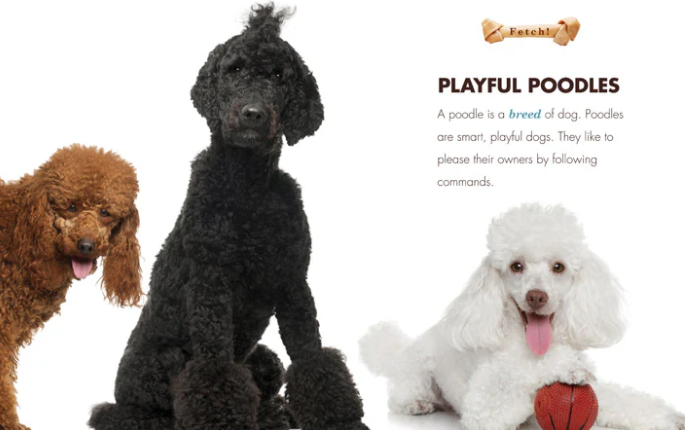
Ownership by Celebrities
Many celebrities, including Elvis Presley and Elizabeth Taylor, have owned Poodles, further boosting the popularity of this elegant breed. Their glamorous reputation in the media has cemented Poodles as symbols of luxury and refinement.
Adopting or Buying a Poodle
Adoption vs. Buying from a Breeder
When considering adding a Poodle to your family, you can either adopt from a rescue or buy from a reputable breeder. Adoption is a wonderful option for giving a homeless dog a second chance at life, while purchasing from a breeder allows you to select specific traits and health screenings.
How to Choose a Healthy Poodle
If you choose to buy from a breeder, make sure they are reputable and prioritize the health of their dogs. Look for breeders who conduct health screenings and provide a clean, loving environment for their puppies. When adopting, be sure to ask about the dog’s history and any health concerns.
Conclusion
In summary, Poodles are a fantastic breed that combines intelligence, elegance, and a loving personality. Whether you are considering adopting one or already own a Poodle, understanding their needs and characteristics will help you provide the best care possible. From their grooming requirements to their compatibility with families and other pets, poodles truly make wonderful companions.
FAQs :
How often should I groom my poodle?
It requires grooming every 4 to 6 weeks, but daily brushing is essential to prevent matting.
Are Poodles good with children?
Yes, this breed is generally good with children, especially if they are properly socialized from a young age.
Do Poodles shed?
They are considered hypoallergenic and do not shed much hair, making them a great choice for allergy sufferers.
How much exercise do Poodles need?
They need at least 30 to 60 minutes of exercise daily, along with mental stimulation to keep them happy.
What is the lifespan of a Poodle?
Standard Poodles typically live between 12 to 15 years, while Miniature and Toy Poodles may live slightly longer.
Can Poodles be left alone?
They can be left alone for short periods, but they thrive on companionship and should not be left alone for long hours regularly.

